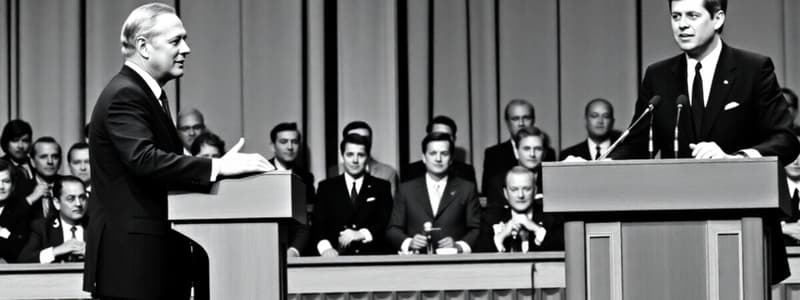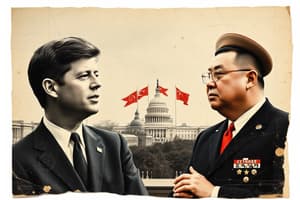Podcast
Questions and Answers
What primary economic strategy did Richard Nixon advocate during the 1960 presidential race?
What primary economic strategy did Richard Nixon advocate during the 1960 presidential race?
- Expansion of social programs
- Promotion of private enterprise (correct)
- Increased federal spending
- Implementation of a living wage
How did John F. Kennedy's approach to combating poverty differ from that of Richard Nixon?
How did John F. Kennedy's approach to combating poverty differ from that of Richard Nixon?
- Kennedy opposed any form of government intervention.
- Kennedy aimed to strengthen the economy through federal programs. (correct)
- Kennedy supported deregulation and privatization.
- Kennedy focused solely on tax cuts.
What significant historical landmark did John F. Kennedy achieve during the 1960 election?
What significant historical landmark did John F. Kennedy achieve during the 1960 election?
- Youngest president elected ever
- First president to resign while in office
- First Catholic President in US history (correct)
- First president to serve two terms
What impact did the televised debate have on Kennedy's election outcome?
What impact did the televised debate have on Kennedy's election outcome?
What outcome did Kennedy's narrow victory imply for the Democrats in Congress?
What outcome did Kennedy's narrow victory imply for the Democrats in Congress?
What was one of the main tactics used by student activists during the civil rights movement in the 1960s?
What was one of the main tactics used by student activists during the civil rights movement in the 1960s?
What was the outcome of the sit-in at Woolworth’s department store in North Carolina?
What was the outcome of the sit-in at Woolworth’s department store in North Carolina?
What characterized the tactics of the civil rights movement in the 1960s?
What characterized the tactics of the civil rights movement in the 1960s?
What were activists prepared for during the Woolworth’s lunch counter sit-in?
What were activists prepared for during the Woolworth’s lunch counter sit-in?
Which of the following best describes the reaction to the sit-in protests in the South?
Which of the following best describes the reaction to the sit-in protests in the South?
What role did the Albany police chief Laurie Pritchett play during the Albany Movement?
What role did the Albany police chief Laurie Pritchett play during the Albany Movement?
Which statement best reflects the beliefs of the Albany Movement activists regarding social justice?
Which statement best reflects the beliefs of the Albany Movement activists regarding social justice?
What was the significance of Black Christianity in the civil rights movement?
What was the significance of Black Christianity in the civil rights movement?
What kind of activities did churches engage in to support the Albany Movement?
What kind of activities did churches engage in to support the Albany Movement?
Which civil rights organizations were part of the Albany Movement?
Which civil rights organizations were part of the Albany Movement?
What was a significant outcome of President Kennedy's assassination?
What was a significant outcome of President Kennedy's assassination?
Which conclusion was drawn by the Warren Commission regarding the assassination of President Kennedy?
Which conclusion was drawn by the Warren Commission regarding the assassination of President Kennedy?
What was a characteristic of Lee Harvey Oswald's background?
What was a characteristic of Lee Harvey Oswald's background?
What did the House Select Committee on Assassinations conclude in 1979?
What did the House Select Committee on Assassinations conclude in 1979?
What was President Kennedy's approach to the civil rights movement during his presidency?
What was President Kennedy's approach to the civil rights movement during his presidency?
What major piece of legislation did Lyndon B. Johnson successfully push for in 1964?
What major piece of legislation did Lyndon B. Johnson successfully push for in 1964?
What was the primary method referred to as the 'Johnson Treatment'?
What was the primary method referred to as the 'Johnson Treatment'?
What socioeconomic background did Lyndon B. Johnson come from?
What socioeconomic background did Lyndon B. Johnson come from?
Which president did Lyndon B. Johnson idolize, influencing his political agenda?
Which president did Lyndon B. Johnson idolize, influencing his political agenda?
What forms of discrimination were outlawed by the Civil Rights Act of 1964?
What forms of discrimination were outlawed by the Civil Rights Act of 1964?
What event did Johnson use as justification for escalating U.S. involvement in Vietnam?
What event did Johnson use as justification for escalating U.S. involvement in Vietnam?
What authority did the Gulf of Tonkin Resolution grant President Johnson?
What authority did the Gulf of Tonkin Resolution grant President Johnson?
How many troops and military advisors were deployed by Kennedy during his first three years in office?
How many troops and military advisors were deployed by Kennedy during his first three years in office?
What was the primary result of the Gulf of Tonkin Resolution?
What was the primary result of the Gulf of Tonkin Resolution?
What type of military engagement was reported by the USS Maddox in the Gulf of Tonkin?
What type of military engagement was reported by the USS Maddox in the Gulf of Tonkin?
Flashcards are hidden until you start studying
Study Notes
The 1960 Presidential Race
- Richard Nixon, Republican vice president, faced John F. Kennedy, Democratic senator, in a highly anticipated election.
- Both candidates aimed to revive the economy, which was experiencing its worst recession since the Great Depression.
Economic Plans
- Kennedy's "New Frontier" plan involved federal programs to boost the economy and tackle chronic poverty.
- Nixon advocated for private enterprise and a reduction in government spending to stimulate recovery.
Historic Debate
- The Nixon-Kennedy debate, held in September 1960, was the first televised debate between major presidential candidates.
- Television exposure played a crucial role in shaping public perception and voter opinions, particularly benefiting Kennedy.
Election Outcome
- Kennedy won the election with a narrow margin of 1%.
- Despite his victory, the Democratic Party lost seats in the House and Senate, resulting in Kennedy lacking a Congressional majority.
Significance of Kennedy's Presidency
- Kennedy became the first Catholic president in U.S. history.
- The lack of a Congressional majority limited his ability to enact key initiatives from the "New Frontier" program.
- Kennedy's composure and performance on television were pivotal in swaying undecided voters.
Civil Rights Movement Overview
- Significant changes in the United States during the 1960s focused on racial equality.
- Movement characterized by confrontational tactics advocating for faster desegregation.
Role of Student Activists
- Student activists played a crucial role in escalating the movement.
- Employed strategies such as protests, marches, boycotts, and sit-ins to push for change.
The Woolworth's Sit-In
- In 1960, four African American students conducted a sit-in at a whites-only lunch counter in North Carolina’s Woolworth’s.
- They insisted on being served, risking ridicule, physical attack, and arrest.
Impact of the Sit-In
- The sit-in tactic faced significant resistance but ultimately led to the desegregation of Woolworth’s.
- Inspired similar demonstrations throughout the South, expanding the reach and impact of the civil rights movement.
Albany Movement Overview
- The Albany Movement united various civil rights organizations, including SNCC, SCLC, and NAACP.
- Its inception aimed to combat racial segregation and promote civil rights in Albany, Georgia.
Law Enforcement Response
- Albany's police chief, Laurie Pritchett, employed mass arrests against protesters but avoided police brutality.
- Pritchett strategically bailed out key officials to prevent negative media portrayals of law enforcement.
Christian Influence
- The movement emphasized a Christian commitment to social justice, highlighting the belief in the equal worth of all individuals in God's family.
- Activists promoted the idea that discrimination and exploitation were incompatible with Christian values.
Role of Religion in Civil Rights
- Black Christianity served as a motivational force in the civil rights movement, underscoring religion's impact on social change.
- Martin Luther King Jr. (MLK) emerged as a key figure within this context.
Cultural and Community Engagement
- Protesters sang hymns and spirituals during marches, reinforcing their message of hope and resilience.
- Church leaders organized meetings, prayer vigils, and conferences to encourage nonviolent resistance among community members.
Civil Rights and Legislative Challenges
- President Kennedy supported civil rights efforts but encountered significant resistance from southern politicians.
- Political capital was not fully invested in civil rights legislation, leading to stagnation in Congress.
Assassination of President Kennedy
- Kennedy was assassinated on November 22, 1963, during a parade in Dallas.
- The assassin, Lee Harvey Oswald, was a former U.S. Marine with Marxist beliefs who had defected to the Soviet Union.
Conspiracy Theories
- The assassination sparked various conspiracy theories challenging the conclusion that Oswald acted alone.
- Theories included potential involvement from Cuba, the Soviet Union, the Mafia, the FBI, or Kennedy's Vice President, Lyndon B. Johnson.
Investigative Findings
- The Warren Commission investigated the assassination, concluding in 1964 that Oswald acted independently with no conspiracy involvement.
- However, the House Select Committee on Assassinations determined in 1979 that Kennedy was likely killed as a result of a conspiracy.
Lyndon Baines Johnson (LBJ)
- Sworn in as Vice President on the day of President Kennedy's assassination.
- Grew up in poverty, which shaped his understanding of social justice and ambition.
Ambition and Influence
- Known for his ruthlessness in political ambition and keen awareness of injustices faced by marginalized groups.
- Idolized President Franklin D. Roosevelt, drawing inspiration for progressive policies.
Civil Rights Champion
- Recognized for passing significant civil rights legislation, outperforming all predecessors in this regard.
- Instrumental in the passage of the Civil Rights Act of 1964, a landmark piece of legislation.
The Civil Rights Act of 1964
- Legislation aimed at prohibiting segregation in public spaces.
- Outlawed discrimination based on race, ethnicity, gender, and national or religious origin.
The "Johnson Treatment"
- Utilized personal relationships and a strong personality to persuade legislators and gain necessary votes for his policies.
- His approach emphasized the importance of personal connections in political negotiations.
Vietnam War Context
- Public ignorance regarding U.S. military involvement in Vietnam during early 1960s, with 16,000 troops and advisors deployed under President Kennedy's administration.
Gulf of Tonkin Incident
- On August 2, the USS Maddox reported being fired upon by North Vietnamese vessels in the Gulf of Tonkin.
- The incident's authenticity was never verified, but President Johnson leveraged it to justify military escalation.
Gulf of Tonkin Resolution
- Passed by Congress, this resolution provided President Johnson the authority to deploy American military forces to assist South Vietnam.
- Marked the commencement of the American ground war in Vietnam in 1965, significantly increasing U.S. involvement in the conflict.
Studying That Suits You
Use AI to generate personalized quizzes and flashcards to suit your learning preferences.




